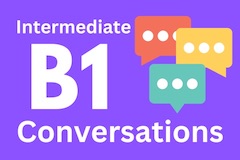How International are you?
Katie and Todd discuss expereinces with people, food and cultures, movies and more.
Todd: OK, Katie.
Katie: Yeah.
Todd: Let's take an international test.
Katie: Oh, OK.
Todd: How international are you? Let's find out.
Katie: Let's find out.
Todd: First, have you ever eaten Greek food?
Katie: Greek food? Ah, I've eaten, how do you say it, falafel.
Todd: Oh, is that Greek?
Katie: I think so. I've had that, but apart from that, I've never eaten Greek food. How about you?
Todd: Ah, I think I have. Like, I've eaten Greek yogurt. Does that count?
Katie: That counts.
Todd: That counts?
Katie: That counts.
Todd: OK, have you ever eaten Russian food?
Katie: What's Russian food?
Todd: I think, Russian food, is it borscht? Borscht is like a cabbage soup.
Katie: Hmm, I've never eaten Russian food.
Todd: Yeah, maybe I haven't eaten Russian food either. OK, last one, have you ever eaten Vietnamese food?
Katie: Ah, I see it written down. Is it pho?
Todd: Pho, the noodles?
Katie: Yeah, I've eaten pho before.
Todd: Yeah, I've been to Vietnam so I've eaten Vietnamese food a lot. And pho the noodles is really good.
Katie: Yeah, it's delicious.
Todd: I've had that too.
Katie: OK, now let's talk about languages.
Todd: Oh, OK. Have you ever studied French?
Katie: I have. I studied French for five years.
Todd: Oh, can you still speak French?
Katie: Nope. Not at all.
Todd: Yeah, me too. I once studied French years ago, but I haven't spoken French in so long I can't remember anything.
Katie: I can't remember anything either.
Todd: Have you ever studied an Asian Language?
Katie: I've studied Japanese. I can still speak it a little bit now, and I studied a little bit of Korean, but I don't speak Korean.
Todd: Oh, really. OK. Wow, like I've studied Thai because I lived in Thailand for five years, and like you I've studied Japanese, but my Japanese is terrible.
Katie: How about your Thai?
Todd: My Thai is OK. It's OK. I can talk a little bit. OK, so have you ever met a Spanish person?
Katie: A Spanish person? Actually, I don't think I have.
Todd: Really?
Katie: I don't think I have met a Spanish person.
Todd: Oh, interesting. I've been to Spain so, I've met a few and we have a Spanish teacher at our school.
Katie: Oh, maybe I have met a Spanish person then. Maybe, I've met a secret Spanish person.
Todd: OK, have you met a Chinese person?
Katie: Oh, yes, I've meet lots of Chinese people.
Todd: OK, and have you met a Brazilian person?
Katie: I feel like if I say no, then I have. Probably. Probably, I've met a Brazilian person.
Todd: Yeah, I've met a few people from Brazil, so they're alway very nice. Very friendly people.
Todd: OK, we'll talk about movies.
Katie: OK.
Todd: Have you ever seen a German movie?
Katie: I haven't seen a German movie. I haven't seen very many movies.
Todd: Oh, OK.
Katie: Even English movies, I haven't seen very many.
Todd: Well, have you seen a Canadian movie?
Katie: Uh, I don't know. Have I?
Todd: Well, the thing is, in Hollywood in America, all the famous actors are Canadian, so I think everybody's seen a Canadian movie.
Katie: I've definitely seen a Canadian actor.
Todd: Yeah, all actors in America are Canadian it seems like.
Katie: I think so.
Todd: OK, have you ever bought something from Italy?
Katie: From Italy. I have. I have bought - not for me - but I bought my mother a bag from Italy one time.
Todd: OK, what was the brand?
Katie: I have no idea. She asked me to buy a brand and I bought it, but I don't know which one it was.
Todd: OK, have you bought something from Japan?
Katie: I've bought lots of things from Japan. I've lived in Japan for a few years, so I've bought all kinds of things from Japan.
Todd: OK, and now we'll move on to countries.
Katie: OK.
Todd: Have you ever been to France?
Katie: I have. Actually, I have been to France a couple of times. My high school has a house in France, so for our school trips we would go to France every year.
Todd: Ooh, how nice.
Katie: Yeah, how about you? Have you been to France?
Todd: You know, I haven't really. I took a bus from England to Prague, so the bus drove through France, but it never stopped.
Katie: I see.
Todd: What other countries have you been to?
Katie: I've been to Germany, I've been to Hong Kong, I've been to South Korea, and I've been to China.
Todd: Wow, you've been to a lot of places.
Katie: Yeah. How about you? What countries have you been to?
Todd: Ah, I've been to countries in Europe. I've been to Israel. I've been to Cambodia, and Laos. I worked in Thailand, and I've been to Taiwan and Korea.
Katie: Wow. Which country did you like the best?
Todd: Oh boy! That's impossible. I will say this, I love ... I love Seoul. I love Seoul, Korea. It's a great city. OK, anyway, thanks Katie.
Katie: Thank you.
Present Perfect
Point 1: Use the present perfect to talk about experiences.
- Where have you worked?
- I’ve worked for many companies.
- I haven’t worked for him.
- Have you been to Europe?
- Yes, I have been to Spain.
- No, I haven’t had the time or money.
Point 2: Use the particle 'yet' in questions to ask if an action occured.
- Have you seen the movie yet?
- Yes, I have seen it.
- No, I have not seen it yet.
- Have you finished yet?
- Yes, I am done.
- Not yet.
Point 3: Use 'already' in affirmative statements. It can go before or after the verb. Also, the answer can use the past tense.
- Have you eaten yet?
- Yes, I've eaten already.
- Yes, I've already eaten.
- Have you called her?
- Yes, I called her already.
- Yes, I already called her.
Point 4: Contractions
- I have eaten. = I’ve eaten.
- I have not eaten. = I haven't eaten yet.
- You have won. = You’ve won.
- You have not won yet. = You haven't won yet.
- She has left. = She’s left.
- She has not left yet. = She hasn't left yet.
- He has finished = He’s finished.
- He has not finished yet. = He hasn't finished yet.
- It has stopped. = It’s stopped.
- It has not stopped yet. = It hasn't stopped yet.
- They have quit. = They’ve quit.
- They have not quit yet. = They haven't quit yet.
- We have won. = We’ve won.
- We have not won yet. = We haven't won yet.

















